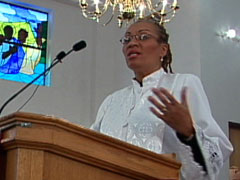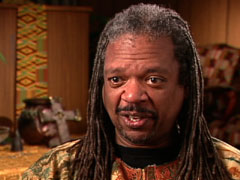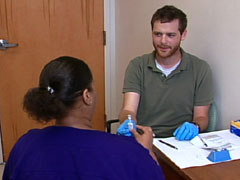In This Episode << SLIDE LEFT TO SEE ADDITIONAL SEGMENTS
HIV-AIDS in DC
REV. CHRISTINE WILEY (Covenant Baptist Church): We pray for health, O God, that you would pour your spirit into them and heal their bodies, O God.
LUCKY SEVERSON, correspondent: Reverend Christine Wiley has been ministering to AIDS patients in Washington, DC since the early 1980s. Back then people were dying from a disease they didn’t understand and had no idea how it was spreading. Reverend Wiley first met AIDS patients when she allowed the health clinic across the street to move into her church when the clinic’s roof fell in.
WILEY: What I found was a profound privilege of being able to work with people who had contracted this disease, and being able to talk with them to help them get to a place where they had hope and understood that they were still loved by God.
 Rev. Christine Wiley |
SEVERSON: Twenty years later, Reverend Wiley is still preaching and teaching about HIV-AIDS, which we now know a lot about. We know that it’s preventable and treatable, and yet it has reached epidemic levels in the nation’s capital. The most recent statistics are sobering. Three percent of local residents have HIV or AIDS—triple the number that is generally considered a “severe” epidemic. But among African-Americans residents, the overall rate is above four percent, which is higher even than parts of West Africa. And among the District’s black men the infection rate is even more alarming—almost seven percent. Authorities are worried that the number is actually higher because so many residents are spreading the virus without knowledge they’re infected. This is Bishop Rainey Cheeks at the Inner Light Ministries Sunday worship service.
BISHOP RAINEY CHEEKS (Inner Light Ministries): We live in a city that has the highest infection rate in the country. We live in Ward 8, and it has the highest infection rate in the city, and here we still operate in a state of ignorance, and the Scripture tell us “my people perish for lack of knowledge.”
SEVERSON: Bishop Cheeks is not your typical preacher. He is openly gay and has been HIV-positive for 25 years.
CHEEKS: People would say, what would Jesus do? And I say stop asking that question. Do what he did. Heal people. Love people. He said feed, clothe, shelter people. That is all HIV is asking us to do.
SEVERSON: The church has long been the most influential institution in the African-American community. But Bishop Cheeks says when it comes to AIDS, too many black pastors have been silent, or preaching when they should have been teaching.
CHEEKS: Throughout our history, the information has always been disseminated through the church. Imagine if all the churches on Sunday morning gave just the facts and where they could go get help. How many people would we reach?
 Bishop Rainey Cheeks |
WILEY (preaching): Have you ever felt persecuted just for living, just for being who you are?
SEVERSON: At the Covenant Baptist Church, Rev. Wiley, who has a doctorate in pastoral psychotherapy, tells her members who have the disease that they are not sinners, that God loves them, and she explains ways to safeguard against the virus to anyone who will listen. Some think the epidemic has passed and don’t want to listen. Some don’t want to know. That’s why Rev. Wiley offers weekly AIDS testing like this, right in church. She says she discovered that many African Americans do not view the black church as a safe place to get counseling about AIDS.
WILEY: There is such a heavy stigma. Then often it’s not talked about. And, of course, within the context of the church one of the things that is difficult is interpretation of Scripture. Many persons within the black church, generally speaking, are very conservative. We find that the issue of sex is not talked about at all in many, many churches, and so if you don’t talk about sex it’s difficult to even talk about risky behavior.
SEVERSON: Bishop Harry Jackson’s Hope Christian Church is typical of many black churches, if not most. Many members here consider drug abuse, premarital sex, and homosexual activity as sins.
BISHOP HARRY JACKSON (Hope Christian Church): Black clergy typically are very conservative socially, and they are much more liberal in terms of other issues. But the heart of the black church is the preaching, and the preaching has to be from the Bible, and that biblical message has been the source of the conservatism of the church, and it’s also the strength.
JACKSON (speaking at rally): And I would rather be biblically courageous than politically correct.
SEVERSON: Bishop Jackson has been a leading spokesman in the District in favor of marriage only between a man and a woman. He agrees that black pastors have not done enough, but sees the problem more as the breakup of the black family.
 JACKSON: We haven’t done the preventative work that puts it in the mind of a young teenage girl or boy, hey, you shouldn’t have sex this early. You’re having all the babies out of wedlock, all these things, and I’ve got to take responsibility for it. The only institution that stands between our community and what I’m going to call basically the destruction of family as we know it today is the church.
JACKSON: We haven’t done the preventative work that puts it in the mind of a young teenage girl or boy, hey, you shouldn’t have sex this early. You’re having all the babies out of wedlock, all these things, and I’ve got to take responsibility for it. The only institution that stands between our community and what I’m going to call basically the destruction of family as we know it today is the church.
WILEY: We’ve got to talk about drug addiction. We’ve got to talk about sex. We’ve got to talk about relationships, because women who are heterosexual and have relationships are also having relationships with men who sleep with men.
SEVERSON: Nationwide, the leading cause of HIV-AIDS is still men having sex with men. But here in the District the principal mode of transmission for new cases is heterosexual for both men and women, and 70 percent of those infected are over 40 years old.
CHEEKS: We put condoms out right here in the church on Sunday. You can walk and pick them up right here, and people go, isn’t that a little extreme? Well, what do you call extreme? Saving someone’s life?
SEVERSON: Bishop Jackson remains skeptical about the reliability of condoms and is firmly convinced that abstinence only is the best policy. He blames much of the problem on immoral behavior and the prevailing culture.
JACKSON: The moral message is not being grasped. The culture is shaping much more what happens in the black church. If I say it this way, in all deference to our stars, Beyonce may be listened to more than the bishop.
SEVERSON: And the bishop has no intention of bending his message about the sin of premarital and homosexual sex, although he doesn’t oppose testing and wants his church to do more to help those who are infected.
WILEY: Even with a person who is a conservative we still have to acknowledge that there is a disease in our community, and it has not gotten better. It has gotten worse.
JACKSON: It may be that we’re going to reach people that trust us and trust our interpretation of Scriptures. But if you don’t believe the Gospel as we believe it, maybe you will not feel comfortable coming to us for help, and maybe that’s where someone else has to work, and my point would be we at least need to touch the people we can touch, and I’m not so sure we’re touching them yet.
SEVERSON: On that point they would all agree.
CHEEKS: I’m more concerned with how do we save our community more than I need to be right or any of that. How do we save our community? And then we can have all the other theological debates later on. But right now, we are in trouble.
SEVERSON: For Religion & Ethics NewsWeekly I’m Lucky Severson in Washington.

